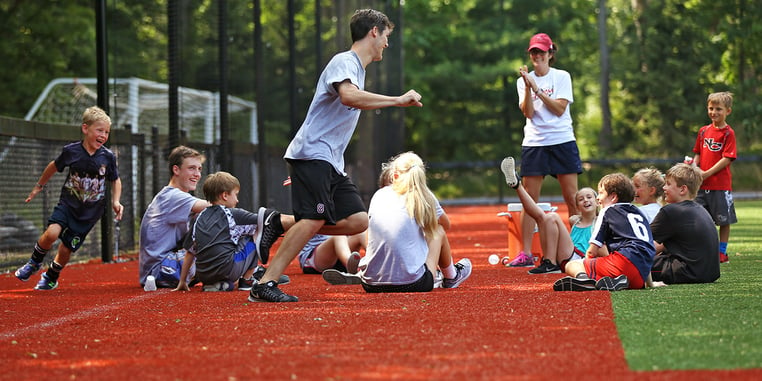With summer in full swing, it’s hard not to look ahead to a new school year. Will our children be ready? Will we be ready? How do we chill out and relax—without forgetting everything we learned while in high gear?
The following tips could benefit the whole family:
1. Unplug
Summer is the perfect time to unplug: turn off the device for five or ten minutes at a time. You may find yourself staring into space, thinking of nothing but the smell of fresh mown grass or the roar of the ocean. Before you know it, you’re unplugged! Sierra magazine is featuring a 100 Hours Unplugged Challenge by OARS.
2.Get Moving
When it comes to mood, memory or learning, nothing beats exercise says Harvard Medical School psychiatrist John Ratey, author of Spark: The Revolutionary New Science of Exercise and the Brain. In his book, he describes how exercise increases the level of brain chemicals called growth factors. These factors not only help make new brain cells but also make new connections between brain cells to help us learn. Complicated activities like playing tennis or taking a dance class provide the biggest brain boost. “You’re challenging your brain even more when you have to think about coordination,” explains Ratey “Like muscles, you have to stress your brain cells to get them to grow.”
 |
| St. Luke's Summer Sports Camp |
3. Grab a partner
Whether it’s playing doubles, taking tango lessons or building a sandcastle, working as part of a team makes you smarter. According the Harvard Business Review, nothing is more valuable in the workplace than smart teamwork. But you don’t need to wait until your career begins—Pinterest has a ton of ideas to begin building collaboration skills while having fun.
4. Read out loud
When we read, we are using our visual pathways to form memory links, and we remember the material because it was something we saw. When we read out loud, we give our brains two more ways to form memory links: producing the sounds and hearing them, says Art Markman, in his blog in Psychology Today. He says that if you are studying material, identify those bits of information that are most important to remember and speak those bits aloud while studying. Even a whisper will help to make those items more memorable.
Make it more fun by taking turns reading out loud to a sibling or buddy. Do voices when you read dialogue – think of the reader and listener as in a collaboration, says Jim Dale, voice of the Harry Potter series. According to this New York Times story, “neuroimaging research suggests that dialogue in a story activates a part of the brain known as the right temporo-parietal junction, a key region for what’s called theory of mind, or the ability to attribute mental and emotional states to others.”
5. Write letters
When it comes to real, heart-to-heart communication between two people, fast is not always best. While it’s true that texting can mean immediate gratification, it’s also true that it can lead to immediate confusion, and even disappointment. Research shows us that the benefits of snail mail should not be ignored. The physical act of handwriting makes us smarter and even more optimistic, according to this Huffpost story, and the benefits last longer. Letters and postcards offer concrete proof of our shared thoughts and feelings, creating memories that resonate long after yesterday’s bits of data have been erased from our phones. After all, how profound can any of us really be in seven words—the length of the average text?
Take a look at how many of us in the St. Luke's community keep our brains in shape by visiting Summer at St. Luke's. Several programs are open to the public. Join us if you can.
St. Luke’s is a private, secular (non-religious) independent school in New Canaan, CT serving grades 5-12. St. Luke’s mission: An exceptional education that inspires a deep love of learning, a strong moral compass, the commitment to serve, and the confidence to lead.
Get our latest blog posts!

By Author
- Amber Berry: Former Head of Middle School ( 2 )
- Beth Yavenditti: Director of Global Education ( 3 )
- Carrie Meatto: Spanish Teacher ( 1 )
- Daphne Teittinen-Schreck: ESS Director ( 1 )
- Dr. Jason Haynes: History Chair ( 2 )
- Dr. Stephanie Bramlett: Former Director of Inclusive Excellence ( 2 )
- Gareth Fancher: Director of Emotional Intelligence ( 1 )
- Georgia Rosenberg '19: Student ( 1 )
- Hunter Martin: Summer Program Director ( 1 )
- Jacqueline Nelson: Director of Equity and Inclusion ( 4 )
- Jane Olsen: Fifth Grade Teacher (retired) ( 1 )
- Jason Giffen: Director of Enrollment Management ( 4 )
- Jessie Samuel, Fifth Grade Science Teacher ( 1 )
- Jim Foley: Asst. Head of School for Leadership & Innovation ( 2 )
- Jim Yavenditti: Director of Studies ( 1 )
- Joshua Schneider, Upper School Science Teacher ( 1 )
- Julia Gabriele: Associate Head of School & Chief Financial Officer ( 5 )
- Kate Parker-Burgard: Director of Community Connections ( 22 )
- Liz Perry: Assistant Head of School for Academics ( 11 )
- Mark Chuhta: Asst. Head of Middle School ( 1 )
- Mary Halpin Carter: Head of School ( 3 )
- Nancy Troeger: Director of Marketing and Communications ( 3 )
- Sonia Bell: Director of College Counseling ( 2 )
- Stephen Vehslage: Associate Director of College Counseling ( 1 )
- Students: Jack Briggs '21 and Liam Patty '21 ( 1 )
- Tom Owen: English Teaching Fellow ( 1 )
- Gareth Fancher ( 1 ) [Show All]
Recent Articles
Posts by Topic
- Leadership (44)
- Character (33)
- Mission (32)
- Community (28)
- School (25)
- Innovation in Education (18)
- Lifelong Learning (18)
- Service (18)
- teens (18)
- private school (14)
- Inspiration (13)
- Values (13)
- Moral Compass (11)
- Parenting (10)
- Diversity & Inclusion (9)
- Global Perspective (9)
- Above and Beyond (7)
- Gratitude (7)
- Moral Courage (7)
- Well-Being (7)
- Freedom (4)
- Mindfulness (4)
- SLSHeroes (4)
- college (4)
- Civil Discourse (3)
- College Admissions (3)
- Resilience (3)
- Student Voices (3)
- Technology (3)
- humanity (3)
- Meditation (2)
- Parents as Partners (2)
- Postive (Alumni) Outcomes (2)
- Private School Admissions (2)
- student-led learning (2)
- Athletics (1)
- Family (1)
- Patriotism (1)
- middle school (1)











Leave a comment